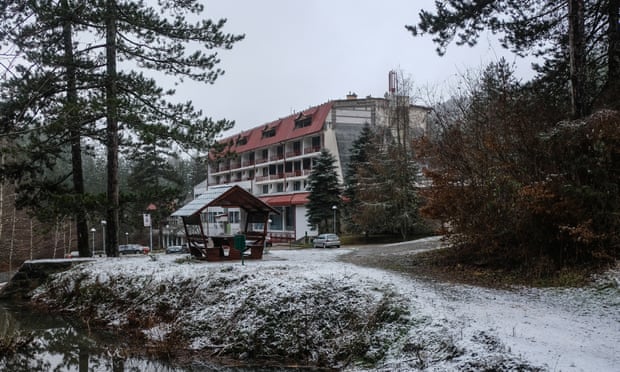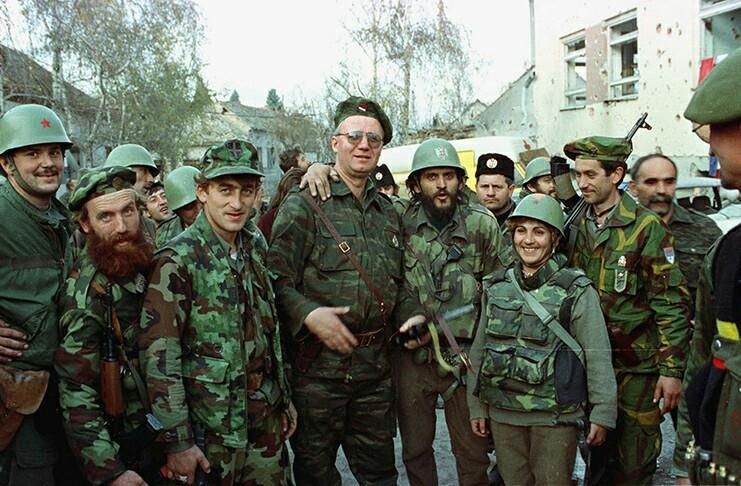A few years ago, whilst on a road trip with a mate through the Balkan country of Bosnia on a research trip for Reaper Feed, we found ourselves in the out skirts of Višegrad, where a local folk festival was taking place. In the 1990s, Bosnia was the epicenter of the bloodthirsty wars that erupted across the Balkans following the collapse of the Socialist Republic of Yugoslavia. The war in Bosnia was defined by war crimes, mass rape, and inhumanity of levels that had not been since the atrocities of the Second World War.
We had been driving for a good few hours on the war-ravaged roads of Bosnia, pockmarked with bombed buildings and abandoned homes. We needed a hotel, and due to the folk festival in Višegrad, most places in the city were booked up or extremely expensive. We drove around 4km from Visegrad before finding a remote spa hotel in the village of Višegradska Banja that looked adequate for the night. The hotel was called Vilina Vlas, and we stepped into the refurbished Yugoslavian era lobby to find nobody there.
As it was winter, we were not surprised to find the hotel eerily quiet. An aging receptionist suddenly appeared and seemed bemused to see two foreigners wanting to check-in. The rooms were dated with beds and other furniture from the 1980s mixed with modern made in China stuff. I’ve stayed in some rough former Communist hotels and get a kick out of their quirkiness. This hotel wasn’t run down, but that night we both found that we were struggling to sleep properly. The hotel was freezing despite adequate heating, and a terrible atmosphere seemed to hang in the air.
The history of Vilina Vlas was rather unremarkable during the Yugoslavian era when it was operating a bog-standard hotel. However, during the inhuman Bosnian war, the hotel was captured by armed Serb militias known as the White Eagles. These paramilitary forces transformed the hotel into a makeshift concentration camp for any of the local population who was not an ethnic Serb. As well as an execution place for ethnic cleansing, the hotel served as a rape camp where many Bosniak women and underage girls were brought to be systematically raped by the militia and police forces.
The White Eagles paramilitary group, also known as ‘the avengers’ or ‘the wolves’, was led by a Serb commander called Milan Lukic. The group was closely interlinked with local Serb police and military units, giving them free rein in their abhorrent crimes. The group set up their HQ at hotel Vilina Vlas before launching a campaign of ethnic cleansing on nearby Višegrad, committing numerous crimes including murder, rape, torture, beatings, and looting.
A United Nations report estimated that over 200 Bosniak women were detained at the hotel and violently raped. Some of the women chosen were said to have been carefully selected on their looks and beauty and chosen to bear Chetnik children. The prisoners who were not chosen to bear children were raped and repeatedly beaten with guns and metal bars. Various prisoners were killed at the hotel or lost their minds and killed themselves. Corpses were thrown into the river at the back of the hotel, which was said to have turned red with the blood.
Rumors of the infamous hotel concentration camp soon became known outside of Bosnia, and it was subsequently closed down. By the end of the war, most of the prisoners were dead and buried in unmarked graves or too insane to testify against their former captors. Only ten are said to have survived the violent frenzy at the hotel of horror.
Following the end of the Bosnian war, the White Eagles commander Milan Lukic was captured and brought to trial at the Hague. He was charged with the murder of prisoners, but despite the various testimonies brought against him, he was not charged for mass rape. One of Lukic’s commanders was charged with the rape and grave sexual abuse of prisoners at the Vilina Vlas hotel, along with the mass murder of 70 people. The local chief of police was also charged with assisting in the torture, rape, and execution of detainees at Vilina Vlas. The director of the hotel was also reportedly a prominent figure in the rape that occurred, but he was never brought to justice and is apparently still living on a pension in Višegrad.
Following the ethnic cleansing of the area, it was populated almost entirely by Serbs during the post-war years, and they made significant steps to forget about the history of the hotel leading to it subsequently being opened as a resort with very little modernization since its darkest days.
Hotels all have a past, watch where you sleep.




